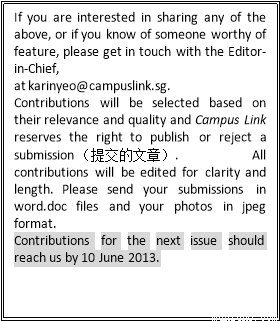题目内容
A decades-old tradition, illustrated in a modem children's book, links the sweetness of honey with the joy of learning to read.
The grandpa held a jar of honey so that all the family could see. He then dipped a spoon into it and put some honey on the cover of a small book.
The little girl had just turned five. Stand up, little one, "he asked the girl softly. "I did this for your mother, your uncles, your
old brother, and now you ! "
Then, he handed the book to her. "Taste f "
She touched the honey with her finger and put it into her mouth.
" What is the taste?" the grandpa asked.
The little girl answered, " Sweet ! "
Then all. the family said in a single voice, "Yes, and so is knowledge, but knowledge is from the bee that made that sweet honey, you have to go after it through the pages of a book ! " The little girl knew that the promise to read was at last hers. Soon she was going to learn to read.
This is the beginning of a profoundly moving children's book entitled Thank You, Mr. Falker.
In this book, Patricia Polacco writes of her own passion to read, inspired by the honey on the book. It wasn't until fifth grade that she met her beloved teacher who provided the help that she needed to finally unlock the magic of the written world.
The child learning to read is admitted into a collective memory by way of books. And with the printed words that are active with. meaning, the child bees acquainted(熟悉的) with a common past which he or she renews, to a greater or lesser degree, in every reading. Much as the author of the book Thank You, Mr. Falker puts it, " Almost as if it were magic, or as if light poured into her brain, the words and sentences started to take shape on the page as they never had before-And she understood the whole thing---Then she went into the living room and found the book on a shelf, the very book that her grandpa had shown her so many years ago. She spooned honey on the cover and tasted the sweetness---Then she held the book, honey and all, close to her chest. She could feel tears roll down her cheeks, but they weren't tears of sadness- she way happy, so very happy. "
1.The girl who tasted the honey on the book was ______.
A. nearly six years old B. less than five years old
C. a little more than five years old D. more than six years old
2.It can be inferred from this passage that_______.
A. the girl's mother and uncles were good scholars
B. Mr. Falker helped Patricia Polacco write her book for children.
C. the girl who tasted the honey on the book grew into an artist
D. the honey-on- book tradition has been practiced for many generations
3.The book entitled Thank You, Mr. Falker is about
A. the early life of Mr. Falker
B. the magic power of oral words on children
C. Polacco's early experience with reading
D. how the honey on the book makes children feel happy
4.The last paragraph implies that the happiness of the little girl came from _______.
A. the ability to read books B. the honey she tasted
C. the book her grandpa had shown her D. the collective memory that accepted her
1.C
2.D
3.C
4.A
【解析】作者在本文中通过介绍Thank You, Mr. Falker这本书告诉我们阅读是可以给我们带来很多的快乐的,倡导我们多阅读。
1.C
【试题解析】细节题。根据第三段第一句 The little girl had just turned five.可知这个小女孩刚刚5岁多一点,故C正确。
2.2】D
【试题解析】推理题。根据文章第一句A decades-old tradition, illustrated in a modem children's book, links the sweetness of honey with the joy of learning to read.中的A decades-old tradition可知这是一个几十年的老传统,所以可能是几代人都这样做的一个老传统。故D项正确。
3.3】C
【试题解析】细节题。根据文章倒数第二段In this book, Patricia Polacco writes of her own passion to read, inspired by the honey on the book. It wasn't until fifth grade that she met her beloved teacher who provided the help that she needed to finally unlock the magic of the written world.可知作者在这本书里主要描述的是自己小时候阅读的经历。故C正确。
4.4】A
【试题解析】推理题。根据文章最后3行Then she went into the living room and found the book on a shelf, the very book that her grandpa had shown her so many years ago. She spooned honey on the cover and tasted the sweetness---Then she held the book, honey and all, close to her chest. She could feel tears roll down her cheeks, but they weren't tears of sadness- she way happy, so very happy. "可知这个小女孩从书中得到的是真正的快乐,而不是悲伤和痛苦。故A正确。
【长难句解析】
A decades-old tradition, illustrated in a modem children's book, links the sweetness of honey with the joy of learning to read.
【翻译】一个在现代儿童图书里阐述的几十年的老传统把蜂蜜的甜美和阅读的快乐联系在一起。
【分析】本句中的过去分词短语illustrated in a modem children's book在句中作为定语修饰前面的先行词tradition,主要是因为两者之间构成逻辑上的被动关系,所以使用过去分词的形式。相当于非限制性定语从句which was illustrated in a modem children's book。







